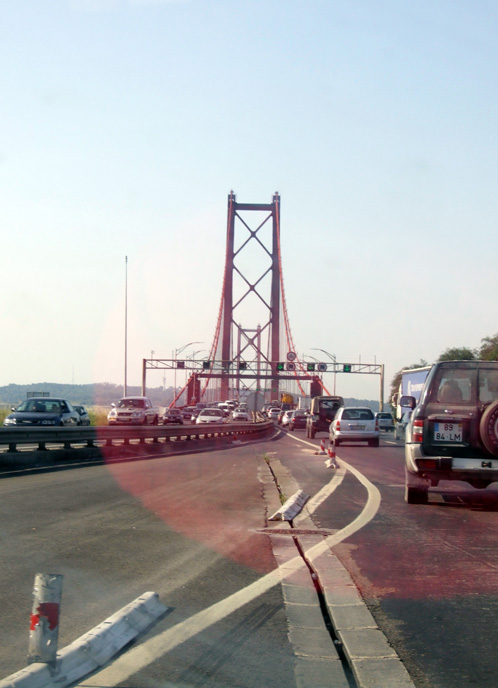Today, 25th April, is a national holiday in Portugal. It is the anniversary of the Carnation Revolution and this day commemorates the start of the bloodless military coup which with the help of civil resistance led to the fall of the Estado Novo bringing democracy and civil liberties to the Portuguese people and the withdrawal of Portugal from its African colonies. It brought to an end nearly five decades of dictatorship (1937-1974).

The revolution was undertaken by the Armed Forces Movement (MFA) led by General Antonio Spinola and other prominent civilian and army figures. The military forces quickly overwhelmed the government, sparking spontaneous demonstrations in the street, in which civilians ran out to mingle with the soldiers, despite orders to stay inside.
At the time, carnations were flooding the famous central flower market of Lisbon, and many citizens put them into the gun barrels of the soldiers, inspiring the name “Carnation Revolution” to describe this event in Portuguese history.
In 1974, more than half of Portugal’s government budget was spent on its armed forces engaged in wars in three of Portugal’s African colonies. The new regime implemented a swift decolonization program granting independence to Guinea-Bissau, Mozambique, Cape Verde Islands, Sao Tome and Principe, and Angola.
The economic cost of this was that Portugal underwent severe economic turmoil, which took a long time to stabilize and has left Portugal a relatively poor country since.
Over the course of the next decade a stable two party system was established. Soon after, in 1980, the archipelagos of Madeira and the Azores became autonomous regions to enjoy self-government.
We are reminded of our peaceful revolution and our freedoms every time we go to Lisbon– the former Salazar Bridge which crosses the river Tejo was renamed Ponte 25 de Abril in remembrance.

Whist Portugal is celebrating its peaceful revolution with a public holiday and as much pomp and circumstance as they can muster others across the world are celebrating and commemorating a variety of other things.
In Australia and New Zealand they are commemorating those “who served and died in all wars, conflicts, and peacekeeping operations” and “the contribution and suffering of all those who have served.”

Originally, 25 April every year was to honour the 78,000 members of the Australian and New Zealand Army Corps (ANZAC) who fought at Gallipoli during World War I. Today is the 98th Anniversary of that landing.
Thousands of people attended dawn services of remembrance in Perth and all across Australia.
Lastly the most unusual holiday today — World Penguin Day.
Such a fantastic and artful history lesson, Nicola, thanks for sharing this celebration with us in your part of the world!
Every day is Penguin Day! SMILE!
It is a very simplistic version. It is hard to comprehend in some ways how recently democracy arrived here and just how hard the decades of dictatorship were on the population not only in terms of “human rights” and censorship but also in terms of food poverty.
Today is an extra special Penguin Day !
Do you think the democracy will last?
I lot the shards of red in this celebration.
The shot of the bridge is fantastic!
I think now we are in Europe – and seriously in debt to Europe that we will remain a democracy. There is a risk however if Europe is allowed to squeeze us too hard – there are already questions being asked about the disparate rates of interest being charged on EU bale outs – Spain was charged half a percent with 10 years to pay – Portugal got charged three and a half percent for a simialr period and it was our politicians who did not fight hard enough for our corner.
Oh, my! That is quite a repayment disparity. The biggest threat to democracy always seems to be economic. Being hungry gives people a larger incentive to fight the power — they can deal with just being threatened by a gun.
@David . The Portuguese people I have encountered are remarkably stoic – they just get on with things – this again I think is a mentality that is an inheritance from living under a dictatorship. However there is a new generation born into democracy and they are children of a modern age who have been educated in a democracy – this is where the discontent will come from. Until Portugal elects a president from this age/age group not a lot is going to change faster than it is already.
I’m shocked that it has been such a short amount of time that you have had democracy! Thank you for the lesson! 🙂
It definitely goes against what one would think …………………
You summed up the history so nicely. some of us need these little history lessons once in a while, just enough info to make the point and also make us stop and think for a bit – and of course just enough to pique our interest enough to make us read more.
And happy penguin day to you as well!
Smiles I needed the history lesson as well – I am really loving getting to know my new home and put everything into context.
I had to do the penguins …………………………………… so cute
Cute is always good.
Wow, thanks for the lesson for those of us who can’t experience Portugal in person. I love the idea of all those defiant citizens putting carnations in gun barrels.
I have been talking to some of the “family” – I have been hearing that some parts of the country did not find out about the revolution for a couple of weeks. Remote rural areas which had no television service heard the news as gossip but did not believe it unto officials came to visit and told them.